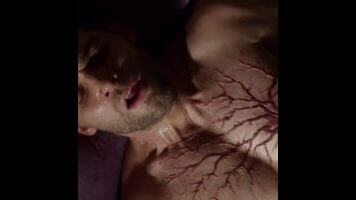Syfy’s Childhood’s End is caught in adolescence

Syfy’s Childhood’s End miniseries is, in theory, at once a no-brainer and a distressing, nigh-impossible prospect. The book it’s based on, by sci-fi don Arthur C. Clarke, is a fantastic, seminal work of the genre, presenting a thought-provoking look at the potential result of humanity’s first contact with aliens. In that respect, it’s a natural fit for the network, which is trying to get back into “serious” genre fare with properties like The Expanse and an upcoming adaptation of Lev Grossman’s Magicians novels. On the other hand, Childhood’s End is, to put it mildly, a dense book, one that covers several decades and forces the reader to confront some distressing ideas.
In the attempt to translate those ideas, writer and executive producer Matthew Graham has mostly split the difference between intellectual intensity and comforting, easy action, constructing a mostly faithful adaptation airing in three feature-length parts that still leaves something to be desired—perhaps including brevity. Even when it’s working, this adaptation feels far too long. Here, when Earth is visited by the alien overlords, their representative Karellen (Charles Dance) chooses Missouri farm boy Ricky Stormgren as their intermediary with humanity, and manages to forge a personal relationship with him as the overlords’ plan for Earth unfolds.
Unfortunately, as played by Under The Dome’s Mike Vogel, Stormgren is incredibly boring, and if the story of his marriage and lost love are part of the attempt to make Childhood’s End palatable to a broader audience, its deeply conventional qualities are counterproductive in the attempt. (As the good-natured dude from a midwestern farm with the weight of the world on his shoulders, Stormgren resembles a powerless Superman.) Why smuggle a still-relevant story that’s been ripped off for years inside something else you’ve already seen a hundred times?
That’s the main problem with the way the miniseries is structured, tracking each of three stages of the overlords’ presence through a couple of central characters in 90-minute intervals. There’s a certain loss of dramatic tension that comes with any direct translation of twists from an original work, but it’s heightened here—especially because the adaptation is a victim of the source material’s success. Nearly all of the tropes established by Childhood’s End have seeped into the DNA of not only science fiction, but pop-culture stories at large, from the contemplation of genetic memory to the way it metaphorically (and literally) grapples with mortality.
An established baseline makes it more difficult to surprise, and more difficult to provoke fresh thinking, particularly when most of the other choices that deviate from Clarke serve to make the miniseries more conventional. These are, primarily, standard problems with bad TV—like dramatic conversations being conveniently interrupted by screaming children, romantic relationships between characters that exist largely because they spend a lot of time together on screen, or the isolated stories that the miniseries spends its time jumping between. (The exception to that last problem: a very fun sequence at the end of night two that brings many of the main characters together.) The drippy cover of “Imagine” used to depict the utopia created by the overlords is a stand-in for a bit too much of the miniseries—yes, we get the point.
Still, there’s a lot to like about Childhood’s End for fans of the book, and for fans of lighter sci-fi TV. Though Vogel takes up much of the oxygen, the rest of the cast is forceful enough to make it easier to connect with the themes of the book. Charles Dance is excellent as Karellen—it’s great to hear Dance’s booming voice presented as, essentially, the word of God. (The reveal of Karellen’s true appearance, though familiar to book readers, is still quite striking—especially because it’s the imposing Dance himself, and not CG sleight of hand.) Julian McMahon, who dominates part two, is perfectly deployed as power-hungry duped collaborator Rupert Boyce. And as Milo Rodricks (Jan in the novel), Osy Ikhile is a pleasant surprise, imbuing a scientist’s tragic, single-minded pursuit of knowledge with a certain level of sadness.
And in rendering the broad strokes of what makes Childhood’s End compelling, Graham and company succeed in effectively visually recreating many of the book’s more striking images. As the Earth’s children evolve in disorienting and creepy ways, they scare the adults and provoke a deeper fear of the unknown. Rodricks’ pursuit of knowledge plays well against Boyce’s vanity as a means of dramatizing several distinct human responses to alien neighbors. The final image of the novel would be striking in any medium, but is more than competently handled by director Nick Hurran (who also takes on the other two episodes). Where starting with that ending would, in most cases, be irritating, here it simply hammers home the inevitability and powerlessness most of the characters feel in the face of a fate that they cannot understand.
Accordingly, Graham’s script is most successful when it softly pushes up against those same bounds of fate—Ricky Stormgren expressing mild irritation at the Overlords destroying his house, Karellen deploying English idioms, or Rodricks making small talk about the end of labor. These are moments when Childhood’s End is allowed to breathe, and feels more like a piece of television than a direct translation. They are the moments where, like humanity itself, the novel is allowed to evolve.